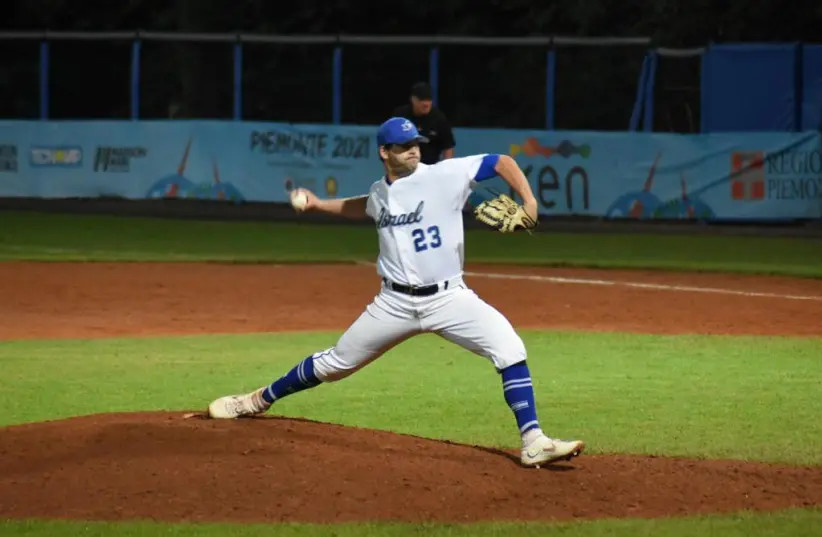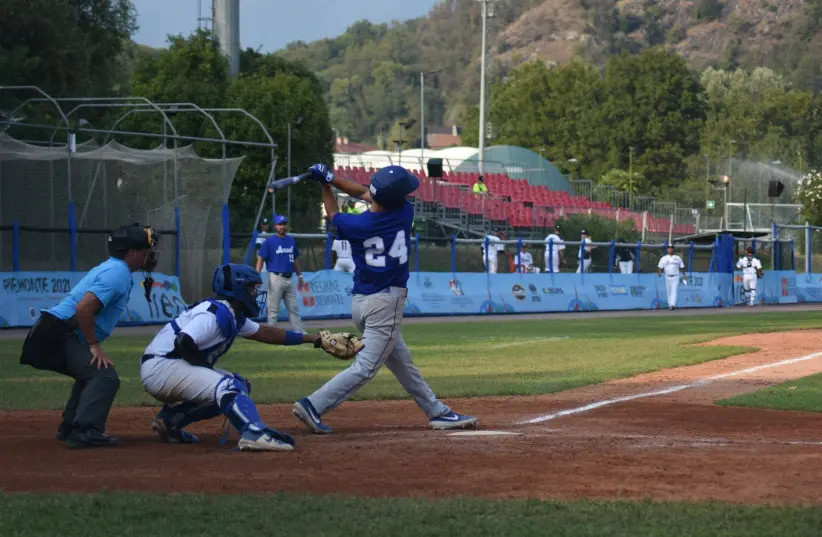Israel won the silver medal at the European Baseball Championships in Torino, Italy this week, going undefeated through its first five games until finally going down to the continent’s perennial champion from the Netherlands. Along with the medal, Israel earned respect at home and abroad.
On his flight home, Israel Manager Nate Fish Tweeted over his colorful handle @KingofJBaseball: “So proud of the boys. I don’t think people realize how improbable this was.”
Fish was referring to the fact that Israel had just come off a grueling summer in which it had prepared for and participated in the Olympics. However, even though Israel had been the only European team to earn a ticket to Tokyo, six of the 16 teams in the European tournament sported a better world ranking.
More importantly, these other teams were rested, whereas many of Israel’s players, including several marquee names, were unavailable due to injury or couldn’t get out of professional commitments to make a second extended trip barely a month after leaving Japan.
As a result, Israel approached the current European Championship with only 17 players on its roster, as opposed to 24 that every other team fielded.
Rising to the occasion, 10 Sabras representing the best of Israel’s homegrown talent stepped up to the plate, along with a cadre of Olim who have helped build the program over the years.
“This was a coming of age for Israeli baseball,” said General Manager Peter Kurz. “We had built our national team from the top down, starting with our World Baseball Classic and Olympic squads. We brought Jewish-American ballplayers to play alongside our local players. They produced great results, which created an interest among Israeli youth. Now it’s the players who grew up in our system, playing in our academy, who have proved that they’re up to the challenge.”

Catcher Tal Erel and third baseman Assaf Lowengart are among the young Israelis that make Kurz so optimistic. Erel provided stability behind the plate for a pitching staff that included teenager Ivri Margolin and 41-year-old Shlomo Lipetz.

Margolin had a no-hitter going until leaving in the fourth inning against Great Britain in the pivotal game that put Israel into the quarterfinals. Lipetz arrived in Turin as a roster replacement for David “DJ” Sharabi, who hadn’t allowed a run while appearing in relief during each of Israel’s first three games. Lipetz is revered as an icon of Israeli baseball, having pitched for national teams at all levels since the age of 9. Starting the semifinal game against Italy, he overcame a rocky beginning to shut down the murderous Italian line-up, propelling Israel into the final and guaranteeing at least the silver medal.
Lowengart is a hard-hitting 23-year-old third baseman from Moshav Timurim.
“Playing in Tokyo prepared me for the moment," he told The Jerusalem Post. "Before the European tournament, Danny Valencia told me, ‘Now it’s your turn to shine’ – so I knew it was up to me to come through.”
He did exactly that, leading all tournament hitters with four home runs and 13 RBIs. Less than 24 hours after the final out, he was back in his dorm room at Mansfield College in Pennsylvania, where he studies on a baseball and academic scholarship, preparing for a test the same day.
“What really excites me is looking at the younger players who were with us in Italy. Itai Goldner is just beginning his IDF service and he’s already a better hitter than I was at his stage.”
Indeed, Goldner played with youthful exuberance and raced home with the winning run against the Czechs for Israel’s second walk-off win of the competition.
Fish was quick to point out the invaluable contribution of his handful of American Olim.
“With our depleted roster, we needed players who could pitch and play field positions,” he recalled. “We got heroic performances from Joey Wagman, who pitched deep into the first two games he started, which were tight pitcher’s duels." Fish himself made one brilliant move after another, keeping Wagman in the game each time he was relieved, which allowed the hard-hitting hurler to come to bat at just the right moments and deliver key hits.
Fish repeated a similar double-duty tactic with first baseman/pitcher Benny Wanger, who rewarded him with two sterling relief jobs. Fish even used shortstop Ty Kelly in relief against Italy and the former Met responded beautifully over the last two innings, much to the chagrin of Italian manager Mike Piazza.
The numbers put up by this select group of players was staggering.
Wagman led all tournament pitchers in Games started (three), innings pitched (16) and strikeouts (18). He also posted a stingy 1.13 ERA. Wanger tied the leaders with two wins and was named at the medal ceremony as Outstanding Pitcher of the Tournament. But each man’s true value went beyond his numbers, as both kept Israel in games long enough to win. On the offensive side, besides Lowengart’s standout performance, veteran Mitch Glasser made sharp contact almost every time he came up and hit a monstrous .474 for the tournament, while repeatedly coming through in clutch situations. Ty Kelly’s excellent .300 average was bumped up to a .500 On Base Percentage by his patient approach, which allowed Israel’s leadoff hitter to get aboard every other time he came to bat – a practice that wins games.
As impressive as these statistics may be, the real contribution of the veteran American Israelis was their leadership on and off the field.
Kelly took his swings and stayed around the batting cage giving tips to all his young teammates. When they took the field, the younger Israelis were constantly pumping Kelly and centerfielder Rob Paller for advice on how to play their position. And language was no barrier for Glasser as he hung around the dinner table during the long quarantine days at the hotel, relating baseball stories and imparting wisdom from his considerable experience.
The team also welcomed its new players.
Fireballer Charles “Bubby” Rossman made his debut by shutting down the Russians in two consecutive innings, which helped win the tightly fought first game. Jordan Petrushka quickly got some key hits and blasted a home run. These feats helped both men gain immediate acceptance with their new team.
Erel summed up the deep satisfaction over Israel’s first-ever silver medal.
“We are players from four generations of Israelis. We came together with our American brothers who joined us as role models and friends. We melded into one unit with a common soul, a single purpose, and sense of family.”
As for the future, according to Kurz, “2021 will go down as the year of Israeli baseball. Following our Olympic and European achievements, we are looking at two new fields in Beit Shemesh and Ra’anana that are nearing completion. We have already been invited to next year’s Super Six (the top six teams in Europe) and the 2023 European Championships. We can also look ahead to the next World Baseball Classic (hopefully in 2023) and the Los Angeles Olympics is not too far off. Our younger teams have next year’s Maccabiah to look forward to, along with several other tournaments for our U-18, U-23 and other teams. The local media coverage reflects a grassroots enthusiasm that is growing every day. In short, the future is very bright.”
